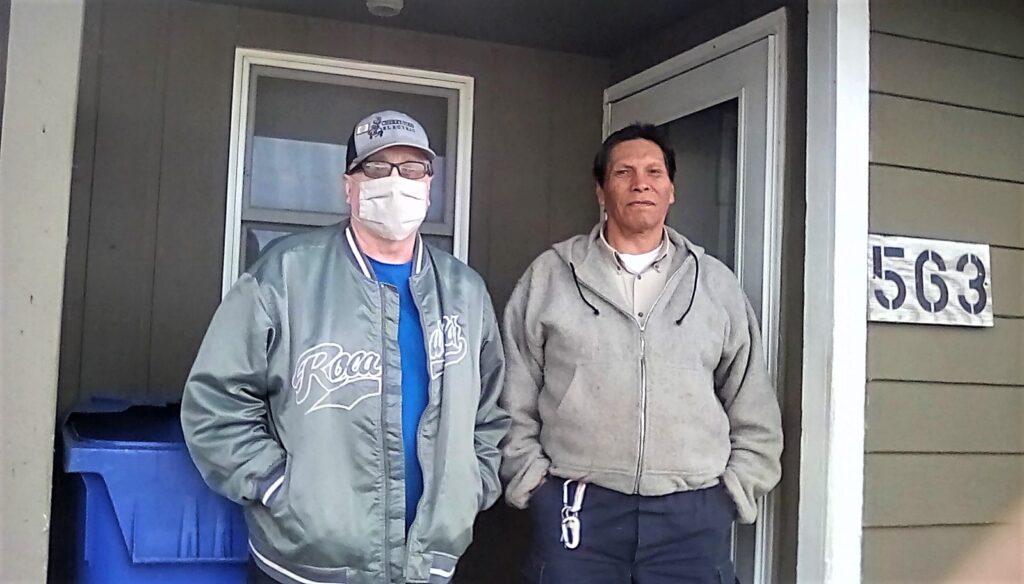Pandemic consolation prize

“That stimulus check really did help quite a bit,” Dominic Eastman (right) said, after Sicangu Oyate volunteer OFFER CARES Coordinator Ronald L. Neiss (left) helped him file to obtain it. COURTESY / Project Stimulus
PART V
ROSEBUD – Dominic Eastman was the first recipient of a pandemic stimulus check in the Sicangu Oyate grassroots OFFER CARES campaign to help individuals access the universal payout that the U.S. Congress provided with the Coronavirus Aid, Relief, and Economic Security (CARES) Act passed in early 2020.
“I heard about the stimulus check, but I didn’t know how to get it or if I would get one,” Eastman told the Native Sun News Today.
Like many living here on the Rosebud Sioux Indian Reservation, Eastman, a 61-year-old enrolled member of the Rosebud Sioux Tribe, has annual earnings of less than the $12,000 minimum for required filing of an income-tax statement.
Since he hadn’t filed a statement, he would not receive the emergency health benefit automatically, as most filers would. He found that out after a friend told him to contact the non-profit Oyate For Fairness and Equal Representation, OFFER.
Eastman got in touch with Project Stimulus – OFFER CARES Coordinator Ronald L. Neiss, who at the time was lobbying the Rosebud Sioux Tribal Council for a contribution to the unique Native grassroots effort to make sure tribal members obtained their Economic Impact Payments.
“Sure enough, he come over and filled out some paperwork,” Eastman said. In three days, he received his $1,200 stimulus check.
Eastman lives in Rosebud and serves at the tribal government’s Sicangu Oyate Tipi Homeless Shelter, receiving modest remuneration from the federal Bureau of Indian Affairs’ General Assistance Program through the tribally administered Sicangu Nation Employment and Training Program.
“That stimulus check really did help quite a bit,” Eastman said. “I used that for some of my clothes, my shoes, and of course, a number of other things,” which included his home electricity bill, he said.
OFFER CARES obtained the payment for Eastman through the IRS Non-Filers Portal online in June, and later, in August, secured $37,000 in tribal government support to help out hundreds of other low-income relatives, many of whom who didn’t have the internet connectivity to claim the crisis relief.
South Dakota U.S. Congressman Dusty Johnson’s staff put Neiss in touch with the IRS for “doing God’s work,” as one staffer put it.
After that, Neiss participated diligently in IRS Economic Impact Payment Awareness webinars, held in October and November to train community-based volunteers for helping non-filers submit claims by a Nov. 21 deadline. He was the only Native American in the group.
Indiana-based IRS Senior Stakeholder Relationship Tax Consultant Sabrina Barton was impressed, saying, “Your vision for those you help is an incredible blessing to all!”
Minnesota-based IRS Stakeholder Liaison Karen Brehmer complimented Neiss. “You sure are living up to your name (Spotted Eagle Who Helps Them),” she wrote him, referencing his Lakota name Wambli Gleska Wawokiya.
She probably appreciated OFFER CARES even more when she learned of “companies that are charging a fee (up to $399) to help people register for their Economic Impact Payment. Some companies are targeting people who are homeless or people who are incarcerated,” she warned.
Neiss and the other OFFER CARES advocates had launched prisoner support for filing in October, after a class-action lawsuit forced the federal government to included detainees in the stimulus check program.
The crew soon realized that the payment process could not be accomplished by the November deadline, nor would it end on Dec. 31, when all stimulus checks were to have been cut.
On Dec. 11, the IRS issued a call for community volunteers to apply to provide free tax return preparation through its Volunteer Income Tax Assistance and Tax Counseling for the Elderly programs.
The agency itself recognized that any number of intended beneficiaries may have missed the opportunity to claim the coronavirus relief, especially with the belated inclusion of the imprisoned. It announced:
“Eligible individuals can claim the Recovery Rebate Credit on their 2020 Form 1040 or 1040-SR. These forms can also be used by people who are not normally required to file tax returns but are eligible for the credit.”
The IRS proposed contracting with OFFER for the local group to supervise a Facilitated Self Assistance program to help stragglers recover their CARES Act share by using these forms. IRS and OFFER agreed to a meeting Dec. 14 to discuss this feature that would provide free tax consulting.
“I want to again congratulate you on the success through Oyate For Fairness and Equal Representation in reaching those who had not received their Economic Impact Payment,” Barton told Neiss in delivering the contract proposal.
The Rosebud Sioux Tribe must approve the contract to move forward, Neiss told the Native Sun News Today.
(Contact Talli Nauman at talli.nauman@gmail.net)
The post Pandemic consolation prize first appeared on Native Sun News Today.
